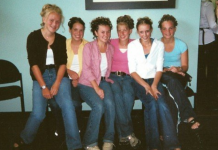 Welcome to Jenna’s Advice Column! Are you going through a rough patch with your partner? Do you have a dilemma at work that’s keeping you up at night? Are you in a fight with your best friend? Share your story and we’ll figure it out together . . .
Welcome to Jenna’s Advice Column! Are you going through a rough patch with your partner? Do you have a dilemma at work that’s keeping you up at night? Are you in a fight with your best friend? Share your story and we’ll figure it out together . . .
*Please note that the advice shared in this article is based solely on the author’s point of view.
Friendship Dealbreaker?
Q: My friend of 10 years is getting married soon and I’m not invited to the big wedding. The two other women in our friend group aren’t invited, either. The bride is the last one of us to get married. She began acting somewhat distant once the rest of us got married and started having kids. I know her fiancé doesn’t like me because we got into a very heated argument over politics a few years ago. I know he doesn’t have a problem with my other two girlfriends, yet they’re still not invited. This feels like a friendship dealbreaker to me. Should I give up on her?
 A: Oh boy! What a mess. I’m so sorry to hear about the breakdown of your friendship with the bride. I imagine you and your two fellow uninvited girlfriends have done some pretty intense venting over this situation! Thank goodness you have each other for support and validation.
A: Oh boy! What a mess. I’m so sorry to hear about the breakdown of your friendship with the bride. I imagine you and your two fellow uninvited girlfriends have done some pretty intense venting over this situation! Thank goodness you have each other for support and validation.
I can understand how the bride distanced herself from y’all over the past couple of years. Being the last single girl can be hard once your previously unattached girlfriends are married off and deep into motherhood. Mom Wives don’t have as much time/space/mental bandwidth as they once did to devote to friendship. And let’s be honest: having toddlers in tow at happy hour kind of kills the buzz for everyone. It makes sense that she’d seek out other single people to socialize with.
But being in different life stages doesn’t explain why you weren’t invited.
I’d imagine you’d still get an invitation based on the 10 years of friendship you’ve shared. Typically big weddings have a handful of guests whose connection to the happy couple is tenuous at best: the groom’s father’s great uncle he hasn’t seen in 20 years; the bride’s ex-co-worker from her summer job at McDonald’s in 2003. Despite the recent distancing, I bet you and your girlfriends are still closer to the bride than a big chunk of the people invited.
This is what I think: the groom is still hurt over your political disagreement and that’s what got you axed from the guest list. Your girlfriends were probably ditched through association. Did you and the bride ever discuss the argument afterward? Is it possible he would’ve bullied her into not inviting you because he’s being indignant or stubborn? My intuition is telling me she wanted to invite you three but he put his foot down and wouldn’t budge.
There’s really no way of knowing unless you talk with her, though. Personally, I can’t stand not knowing or having things unspoken between me and someone else. If I were in your position, I’d muster up the courage to communicate with her for my own mental well-being.
Maybe you’ll find out her husband-to-be is controlling and she’s having second thoughts and needs a good friend right now. Maybe you’ll discover they’re actually having a much smaller celebration with family only. Maybe she’ll call you a nosy witch with a b and hang up on you. Whatever the outcome, at least you’ll have some closure. I know that would help me sleep better.
I’m Still Grieving
Q: My mom passed away about five months ago and I’m still really struggling. My grief is as fresh as if she just passed away yesterday. The experience of losing my mother is interesting because the sympathy I felt from people right after her death has all but vanished now that it’s five months later. But the pain is still so new and real to me. I know grief means something different to everyone and you never know how you’ll experience it, how long it will last, or what will trigger your sadness. Perhaps the people in my life have never suffered a great loss and that’s why they aren’t more attuned to what I need. How should I let them know I’m still grieving and need their support?
 A: My heart breaks for you over the loss of your mom. There are no words I can write that will help ease your pain but please know that I am thinking of you. As someone who has also lost a parent, I get it. We’re flooded with sympathy and texts and bereavement cards during the early stages of grief (denial/anger/bargaining) when we’re too distracted or distraught to fully internalize the support.
A: My heart breaks for you over the loss of your mom. There are no words I can write that will help ease your pain but please know that I am thinking of you. As someone who has also lost a parent, I get it. We’re flooded with sympathy and texts and bereavement cards during the early stages of grief (denial/anger/bargaining) when we’re too distracted or distraught to fully internalize the support.
Once we hit the depression stage — when we could really use the support — is when it’s all but dried up. Those who had checked in on you initially may assume your heart has healed over the weeks or months since your loved one left. Perhaps they’re afraid of bringing up your mom and upsetting you when, in reality, talking about her and having a good cry on a friend’s shoulder is exactly what you need. Some people may be so freaked out by the thought of death that they won’t even mention it for fear of its contagion.
I commend you for facing your grief and feeling your feelings.
Some people (*raises hand*) take the avoidant route and stuff those feelings deep down where they can’t hurt. Ignorance is bliss until it’s not anymore. You’re doing the healthier thing by facing your grief head-on instead of repressing it until it inevitably bubbles up to the surface later.
It sounds like you know what you need: the continued support of your friends and loved ones. I’m a big proponent of asking for what you need. I suggest you open up to your support system and let them know you’re still struggling. You may look pulled together on the outside, but they can’t see what’s happening on the inside unless you tell them.
Good friends are willing to listen to your happy memories and funny stories about your mom. Maybe you’d benefit from talking to a friend who’s also lost a parent to see how they’ve coped. Are there people from your mom’s life who are also struggling similarly? Spend time with them and reminisce together. The first step is seeking out these opportunities, even if it feels awkward or needy, or manufactured. Friends who aren’t willing to offer their continued sympathy aren’t worth having, IMO.
Another idea is to connect with bereavement services in the community. Here is a list of counselors in Charleston who specialize in grief. Speaking with a professional will help you develop the tools you need to heal over time. You can also check out a local grief support group and surround yourself with people who can empathize and sympathize with your pain. Maybe I’ll see you there.














Jenna, You have a wonderful way of looking at a situation and interpreting what is most likely taking place. The “wedding list” is an interesting situation that probably happens more than anyone realizes.
Your article on grief is heartfelt and on point. There is no “right amount of time” to grieve. Everyone grieves in their own way and at their own pace. Thank you for your way with words.
Love this!
Comments are closed.